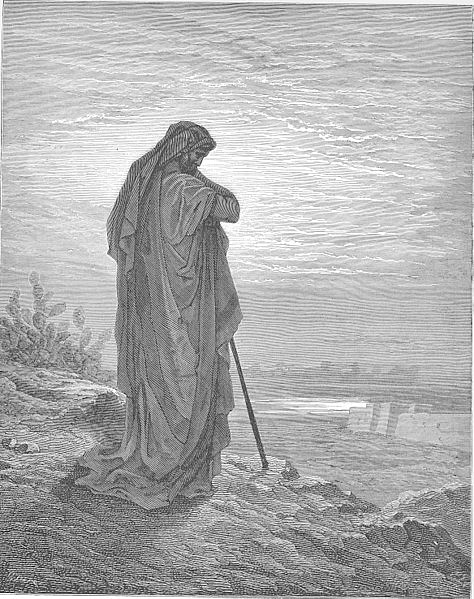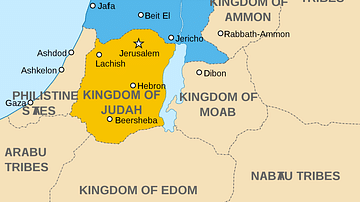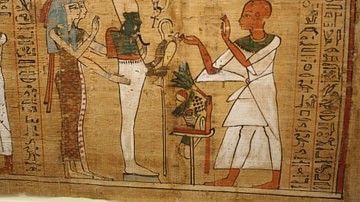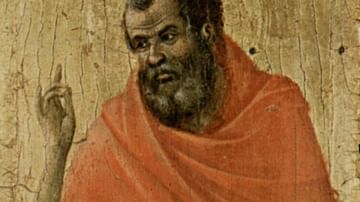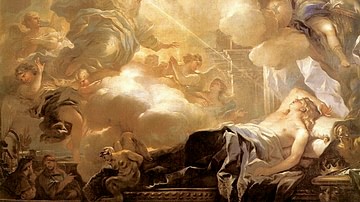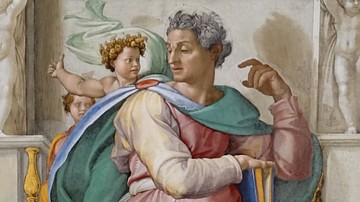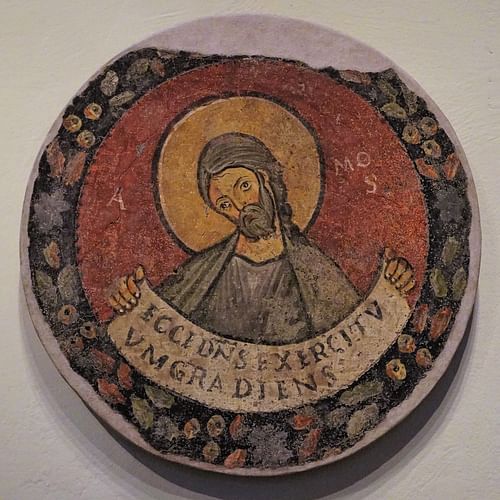
Amos is listed as one of the twelve minor prophets in the Hebrew Bible. Amos was one of the first to put his visions into writing. The earthquake mentioned in the first chapter of the Book of Amos places Amos between 760-755 BCE.
The Two Kingdoms
Around 1000 BCE, the United Monarchy combining the twelve tribes of Israel was achieved in the reigns of King David and King Solomon. Upon Solomon's ascension to the throne, he built the first permanent stone temple in Jerusalem. However, to do so, he conscripted labor from the tribes, which was ultimately compared to Pharaoh in Egypt. He also permitted idolatry in the land; his many wives were permitted to build temples and shrines to their own gods.
After Solomon's death, ten of the tribes petitioned his son to stop the conscription, but he refused. In response, these ten tribes, under the leadership of a man named Jeroboam, seceded and settled in northern Israel. Two of the tribes, Benjamin and Judah, remained in the south. For the next several centuries, the Northern Kingdom of Israel and the Southern Kingdom of Judah sometimes joined together to fight foreign invaders but also fought each other.
Amos was from Judah, but he did his work in the Kingdom of Israel, especially in the cities of Samaria and Bethel. Amos was called to preach in Bethel because the Northern kings had a temple there, famously housing a form of a golden calf, mingling traditions with idolatry, but Amaziah the high priest reported him to king Jeroboam II, and he had to flee south. This may have been when he decided to write down his visions for the benefit of others to follow.
In a period of empire-building, the Assyrians, the inheritors of ancient parts of Mesopotamia, moved west and conquered the Northern Kingdom of Israel in 722 BCE. Assyria removed the Israelites from the area and sent them east. This is when the ten tribes of the Northern Kingdom became lost to history. The next empire to arise, the Neo-Babylonians, conquered Jerusalem and destroyed Solomon's Temple in 587 BCE.
The Role of the Prophets
A fundamental theme of all the books of the Prophets was explaining why these disasters happened. Were the gods of the Assyrians and the Babylonians mightier than the God of Israel? The prophets collectively laid the blame on the sins of the people. The great sin was permitting idolatry and neglect of the commandments. God remained the greatest god in the universe, but he utilized the gods (the powers) of the Assyrians and the Babylonians to punish and discipline Israel. However, the prophets also offered a message of hope: in the future, God would intervene in human history and restore all justice in the final days. Amos consistently referred to this time as "the day of the Lord" or the "day of doom" for sinners.
The writings of Amos became elevated for three reasons:
- Condemnation of the Northern kings of Israel and how it led to their downfall
- Prediction of the fall of Jerusalem
- Emphasis on the neglect of social justice between the rich and the poor
Themes & Teachings in Amos
The prophets of Israel were oracles (a term for a person as well as a place) for ways in which humans communicated with their gods. The oracle was possessed by the deity and served as a vehicle for the words. The first chapter is a series of oracles by God against the cities that were neighbors of Israel: Damascus, Gaza, Tyre, Edom, Ammon, Moab. All these cities were guilty of idolatry and oppressing the Israelites. However, God will also punish the sins of Judah:
For three sins of Judah, even for four, I will not relent. Because they have rejected the law of the Lord and have not kept his decrees, because they have been led astray by false gods, the gods their ancestors followed, will send fire on Judah that will consume the fortresses of Jerusalem. (Amos 2:4-5)
Amos described God as ethical, in that he could not be affected by anything except the righteousness of the believer. As a God of justice, God demands right living and not rituals:
I hate, I despise your religious festivals; your assemblies are a stench to me. Even though you bring me burnt offerings and grain offerings, I will not accept them. Though you bring choice fellowship offerings, I will have no regard for them. Away with the noise of your songs! I will not listen to the music of your harps. But let justice roll on like a river, righteousness like a never-failing stream (Amos 5:21–24).
This idea was also found in other prophetic books, particularly Isaiah and Jeremiah, but the concept was not a ban on Israel's way of worship per se (the sacrifices), but a warning that rituals without righteous living and repentance were worthless. Between God and Israel, the covenant was a moral contract. If Israel does not meet the moral obligations, God has every right to dissolve the contract.
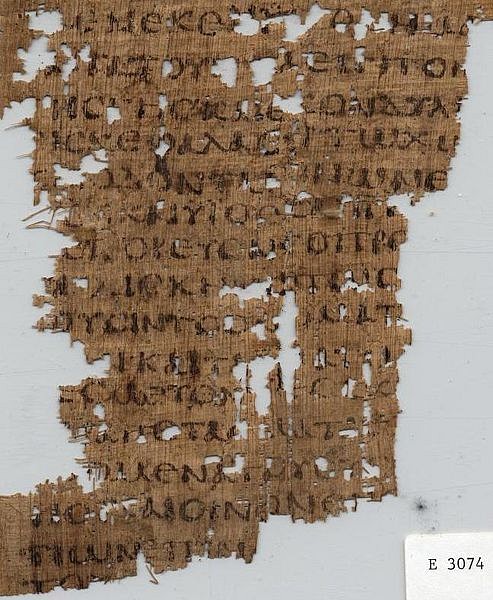
God created the other nations along with Israel, which was to be a righteous model for the others. Just as the nations sinned and would face God’s punishment, so will the Israelites.
I saw the Lord standing by the altar, and he said: "Strike the tops of the pillars so that the thresholds shake. Bring them down on the heads of all the people; those who are left I will kill with the sword. Not one will get away, none will escape ... Though they are driven into exile by their enemies, there I will command the sword to slay them. ... Surely the eyes of the sovereign Lord are on the sinful kingdom. I will destroy it from the face of the earth. Yet I will not totally destroy the descendants of Jacob." (9:1-8)
This last element created a concept known as the righteous remnant. The idea was that there will always be a small group of Israelites who did not sin; they will join with God when he ushers in his kingdom on earth.
Economic injustice is addressed to the women of Samaria and the rulers:
Hear this word, you cows of Bashan on Mount Samaria, you women who oppress the poor and crush the needy and say to your husbands, "Bring us some drinks!" The sovereign Lord has sworn by his holiness: "The time will surely come when you will be taken away with hook, the last of you with fishhooks and cast out" (Amos 4:1-2).
For the rich and complacent of Samaria and Zion:
You lie on beds adorned with ivory and lounge on your couches. ... You drink wine by the bowlful and use the finest lotions, but you do not grieve over the ruin of Joseph. Therefore, you will be among the first to go into exile; your feasting and lounging will end. (Amos 6:4-7)
When will the New Moon be over that we may sell grain, and the Sabbath be ended that we may market wheat?—skimping on the measure, boosting the price and cheating with dishonest scales, buying the poor with silver and the needy for a pair of sandals, selling even the sweepings with the wheat (8:5)
Christian Interpretations
In the earliest Christian missions, Gentiles (non-Jews) wanted to join. In a meeting known as the Apostolic Council in Jerusalem, James made the decision that Gentiles could join without the ethnic identity makers of Jews (circumcision, dietary laws, and Sabbath observance). According to Luke in Acts 15, James rationalized their inclusion by quoting Amos' vision of what would happen when the kingdom of God occurred:
I will restore David's fallen shelter—I will repair its broken walls and restore its ruins—and will rebuild it as it used to be, so that they may possess the remnant of Edom and all the nations that bear my name. (Amos 9:10-11)
At the same time, however, Christian writers applied the past criticism of the Jews by Amos in their polemic against contemporary Judaism as a whole.
In the modern world, Amos is often quoted in critiques against continuing social and economic injustice. Martin Luther King, Jr. (1929-1968) quoted Amos in his "I have a dream" speech: "We will not be satisfied until justice rolls down like waters and righteousness like a mighty stream."
The apocryphal work The Lives of the Prophets claimed that Amos was killed by the son of Amaziah, priest of Bethel. He was buried in Judah. Amos was elevated as a saint in both the Eastern Orthodox and Western traditions.
